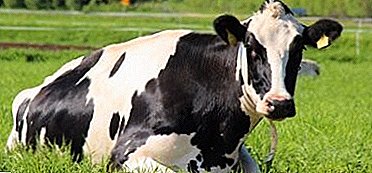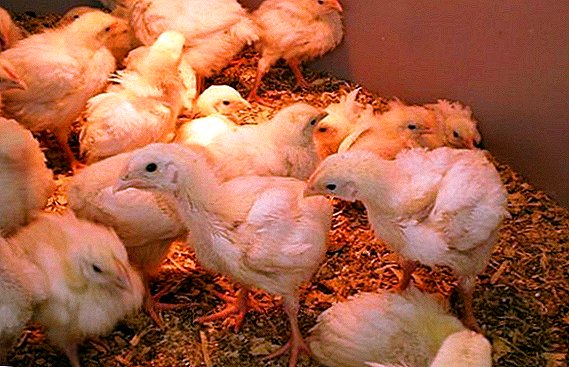 Chives, or chives, popularly known as onion skoroda - a real find for the gardener. It is very useful, has a large number of medicinal properties, adorns the site during flowering, scares many pests of garden and garden plants. In this article you will learn about the useful qualities of chives and what kind of plant it is.
Chives, or chives, popularly known as onion skoroda - a real find for the gardener. It is very useful, has a large number of medicinal properties, adorns the site during flowering, scares many pests of garden and garden plants. In this article you will learn about the useful qualities of chives and what kind of plant it is.
Chives: Calories, Vitamins and Minerals
 First, let's look at what a chives look like. It belongs to perennial herbaceous plants. Its roots are white, thin, filiform. The bulbs are small, oval-shaped, covered with brown husks. The bright green foliage in the form of pipes gives off a smooth thick stalk. In the middle or the end of May, the onion blooms with beautiful purple or pale pink buds that look like fluffy pompons. Incredibly charming flowering skoroda adorns the site for about 20 days. Seeds are black, angular shape, ripen in boxes. The chives form dense bushes, up to 0.5 m high. This is a very early plant, its leaves make their way from the soil in early spring, when the snow begins to melt. Young leaves are saturated green color, tender, juicy. By the summer, during flowering, they become coarse and fibrous.
First, let's look at what a chives look like. It belongs to perennial herbaceous plants. Its roots are white, thin, filiform. The bulbs are small, oval-shaped, covered with brown husks. The bright green foliage in the form of pipes gives off a smooth thick stalk. In the middle or the end of May, the onion blooms with beautiful purple or pale pink buds that look like fluffy pompons. Incredibly charming flowering skoroda adorns the site for about 20 days. Seeds are black, angular shape, ripen in boxes. The chives form dense bushes, up to 0.5 m high. This is a very early plant, its leaves make their way from the soil in early spring, when the snow begins to melt. Young leaves are saturated green color, tender, juicy. By the summer, during flowering, they become coarse and fibrous.
Important! Eat only chive leaves for food. They must be cut young. When the plant blooms, the leaves not only become rough, tasteless, but also lose all the beneficial properties.
This is a dietary product, since there are only 30 kilocalories per 100 g of leaves.
100 g of chives consist of:
- 90.65 g of water;
- 3.27 g of proteins;
- 2.5 g of fiber;
- 1.85 g of carbohydrates;
- 1 g of ash;
- 0,73 g of carbohydrates.
Chives have a rich vitamin composition, which includes vitamins of such groups:
- BUT;
- B1, B2, B3, B4, B5, B6;
- WITH;
- E;
- TO;
- folic acid.
In addition, it contains a significant amount of useful micro and macro elements:
- potassium;
- iron;
- calcium;
- sodium;
- phosphorus;
- manganese;
- copper;
- zinc;
- selenium.
This onion is the leader in its family in terms of the content of vitamins A, C and B. It also supplies essential amino acids to our bodies (lysine, methionine, tryptophan) and contains many phytoncids that fight infectious diseases.
The beneficial properties of chives
Due to the rich content of valuable vitamins and minerals, chives have many beneficial properties.
The most prominent among them are the following:
- enriches the body with vitamins;
- strengthens the immune system;
- supports visual acuity;
- improves appetite;
- effective remedy for worms;
- prevents the development of atherosclerosis;
- eliminates bleeding and gum disease;
- prevents colds or helps fight them;
- helps to get rid of infectious diseases.
 Chives bring great benefits to the body, saturating it with vitamins after winter, when there is practically no natural fresh vitamins in the form of fruits. Strong immunity - a pledge of the absence of viral and infectious diseases, which are very common in early spring. Onions contain folic acid, which is necessary for expectant mothers, especially in early pregnancy. It plays an important role in the formation of a healthy fetus. Due to the high level of beta-carotene, speed helps maintain visual acuity. Essential amino acids, especially lysine, are necessary for athletes to build muscle. In addition, the plant belongs to light aphrodisiacs that stimulate sexual activity.
Chives bring great benefits to the body, saturating it with vitamins after winter, when there is practically no natural fresh vitamins in the form of fruits. Strong immunity - a pledge of the absence of viral and infectious diseases, which are very common in early spring. Onions contain folic acid, which is necessary for expectant mothers, especially in early pregnancy. It plays an important role in the formation of a healthy fetus. Due to the high level of beta-carotene, speed helps maintain visual acuity. Essential amino acids, especially lysine, are necessary for athletes to build muscle. In addition, the plant belongs to light aphrodisiacs that stimulate sexual activity.
Did you know? The onion surpasses the amount of vitamins and benefits not only the human body. This is a great melliferous plant; besides, it scares away plants like aphids, flea beetles and ticks from nearby plants.
The use of chives in traditional medicine
 In folk medicine, use fresh leaves, compresses and infusions of skoroda. To strengthen the immune system and prevent colds it is useful to eat several fresh leaves of the plant every day.
In folk medicine, use fresh leaves, compresses and infusions of skoroda. To strengthen the immune system and prevent colds it is useful to eat several fresh leaves of the plant every day.
Traditional medicine offers the following recommendations for the use of onions for various ailments:
- from worms - during the week, eat 20 g of fresh onion leaves;
- for coughing - finely chop the leaves and pour 2 tablespoons of honey in the evening, squeeze the juice out of the mixture in the morning and use a teaspoon per day;
- constipation - drink a tablespoon of onion juice;
- in case of hypertension, mix the chopped onion in the ratio 1: 1 with honey and apply one tablespoon twice a day;
- from hemorrhoids - once a day for a month, drink 15 grams of onion juice before meals;
- to strengthen the hair in the roots, it is recommended to rub the onion juice;
- in the fight against dandruff - 30 g of onion peel pour two cups of boiling water and cook for 20 minutes, rinse the hair after washing with prepared broth;
- to get rid of acne, wipe the face with a cotton swab dipped in onion juice;
- to combat skin inflammation, chop finely chopped onions in gauze and apply to the affected area for 20 minutes;
- for a cold or sore throat, it is helpful to inhale a pair of fresh onion juice for 3 minutes.
Important! [i] It is necessary to consume chives not later than 15 minutes after cutting. Otherwise, phytonicides will evaporate from the product, and it will no longer be useful.
Onions are a panacea for many ailments, but before using it, be sure to make sure that you do not have any contraindications to it.
How to use the beneficial properties of onion skoroda in cosmetology
Juice and lotions from chives well help with many ailments with skin and hair.
Consider the most popular folk recipes for the use of the skoroda in cosmetology:
- from eels and freckles will help mask of freshly cut onion leaves: gruel spread on cheesecloth and apply for 15 minutes. to the affected area;
- in case of dry skin on the face, it is necessary to mix two baked finely chopped onions, 30 g of linden honey, apply within 10 days on a clean face for 15 minutes;
- from hair loss onion feather finely cut and rubbed into the scalp for 10 minutes, then washed off with warm water and shampoo;
- in order to improve hair growth, for 3 months it is recommended to rub the composition of 1 tbsp into the hair roots for an hour before washing. spoons of onion juice and 2 tbsp. spoons of vodka;
- To get rid of dandruff and make hair shine, it is recommended to rub the onion juice into the scalp once a week and wrap the head with an towel for an hour, then rinse with warm water and shampoo;
- if the skin of the feet is damaged by a fungus, it is recommended to rub fresh onion juice into it for 10 days;
- To combat calluses, you must mix in equal quantities onion juice and lime honey, apply to the affected place at night in the form of a compress.
Important! When working with dry hair, it is recommended to add honey to onion juice, which helps soften them. For oily hair, add a few drops of lemon juice to the onion juice.
Chives in cooking
 Schnitt bewitches with bright greens, tenderness and juiciness of leaves. Therefore, it is so popular in cooking. The leaves of the currant are great for making salads from fresh vegetables, vinaigrettes, and beautiful purple inflorescences will decorate not only the salad, but also a side dish, meat, fish, cheese or sausage slices. Rezanet will give the usual soup or borsch a pleasant aroma and significantly improve the taste of the first courses. It can also be used during the preparation of homemade sausage, meat or fish rolls. Onion is perfect for pate, it will give it a piquancy, freshness and juiciness, what this dish really needs.
Schnitt bewitches with bright greens, tenderness and juiciness of leaves. Therefore, it is so popular in cooking. The leaves of the currant are great for making salads from fresh vegetables, vinaigrettes, and beautiful purple inflorescences will decorate not only the salad, but also a side dish, meat, fish, cheese or sausage slices. Rezanet will give the usual soup or borsch a pleasant aroma and significantly improve the taste of the first courses. It can also be used during the preparation of homemade sausage, meat or fish rolls. Onion is perfect for pate, it will give it a piquancy, freshness and juiciness, what this dish really needs.
Did you know? Chives are considered almost universal seasoning, suitable for all dishes except legumes. This onion inhibits the taste of beans.
Do not interfere with the use of chives in sauces. Just add it to the ready-made, slightly cooled sauce. They can decorate any meat and fish dishes. Skoroda is not suitable for drying and freezing, because such leaves will lose all useful properties. At the same time, it can be used for pickles and starters.
Contraindications and possible harm
Chives have some contraindications that should be considered before using it.
These include:
- work disorders and heart disease;
- liver disease;
- stomach ulcer;
- intestinal ulcer;
- allergic reaction.
It should also be remembered that excessive use of chives can cause harm and provoke the following ailments:
- heartburn;
- nausea;
- headache;
- upset stomach or intestines;
- allergies.
 In identifying such reactions of the body should stop consuming the product, drink black coal in proportion to body weight. If, after using lotions or compresses from onions, skin irritations, rashes, rinse the affected area thoroughly with warm water. In no case will the chives be superfluous to land on your garden plot. A storehouse of nutrients and vitamins, a remedy, a garden decoration and a pest killer - you will definitely like it.
In identifying such reactions of the body should stop consuming the product, drink black coal in proportion to body weight. If, after using lotions or compresses from onions, skin irritations, rashes, rinse the affected area thoroughly with warm water. In no case will the chives be superfluous to land on your garden plot. A storehouse of nutrients and vitamins, a remedy, a garden decoration and a pest killer - you will definitely like it.












